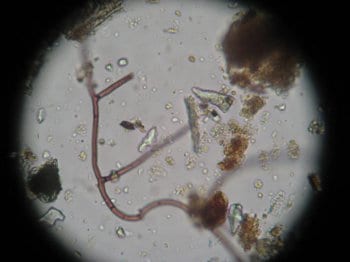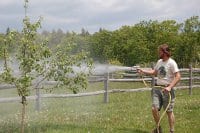by Peter Schmidt
Interest in making and applying Actively Aerated Compost Tea has grown tremendously in recent years, particularly in turf grass management. Many homeowners no longer wish to live in toxic environments, and many schools no longer allow the application of pesticides and petroleum-based fertilizers. Compost Tea provides a way to manage turf and avoid these hurdles.
What Is Compost Tea?
Compost Tea is a liquid representation of specially prepared compost. Water, microbial food resources, and compost are added to a compost tea brewing machine and ‘brewed’ for 24 to 36 hours. During the brew cycle, the biology that is extracted from the compost grows and multiplies exponentially due to the highly aerated and food rich environment created in the compost tea brewing machine. Beneficial bacteria multiply, fungi elongate, and protozoa wake up and get to work cycling nutrients.
Applying Compost Tea
After the brewing cycle is complete, the compost tea is normally pumped into a specially designed sprayer. Much of the time the compost tea is diluted in the ratio of one part compost tea to three parts water; however, it can be applied undiluted to the turf in biologically deficient soils. At the time of dilution, additional microbial food resources are added to the sprayer to help sustain the biology that is about to be applied. Soluble Kelp, Fish Hydrolysate, and Humic Acid additions at dilution are widely accepted in the industry. Typically, five to seven gallons of diluted compost tea is applied per 1,000 square feet.
The type of sprayer that you use to apply compost tea will have a major influence over the viability of the biology being applied. Diaphragm pumps are generally the least destructive. Avoid piston, roller, and centrifugal pumps as the high pressure and mechanical action can destroy the fungal hyphae and protozoa in the compost tea.
There are options when it comes to choosing the right sprayer. Most landscape contractors choose a skid type sprayer which has an electronic hose reel and can easily be loaded in and out of their trucks. Three hundred feet of hose is usually sufficient for most residential properties. Sports field managers might choose a tractor mounted, three point hitch PTO (power take off) sprayer equipped with spray booms or boomless nozzle system. Typically, a 15 to 20 foot swath can be achieved with a tractor mounted sprayer.
So Why Compost Tea?
In short, it’s about efficiency. You will save countless hours in labor and trucking compost. There is no better way to apply large quantities of beneficial biology to large areas. One hundred gallons of high quality compost tea can be biologically equivalent to more that 2,000 pounds of compost! You will also realize the pathogen exclusion benefits of inoculating foliar surfaces with beneficial microbes which is impossible with bulk compost applications.
The biology in compost tea can perform some magical feats. When you are working with compost tea, you are allowing the biology to take control of the nutrient cycling and sequestration in turf grass management. Protozoa consume bacteria which cycle nitrogen. During periods of protozoa dormancy, that nitrogen is sequestered in the bacterial bio mass of the soil. Fungi play an important role in nutrient uptake of turf grass and maintenance of good soil structure. Mycorrhizal fungi actually grow around or within plant roots and aid in the absorption of plant soluble nutrients. Fungi help to form macro-aggregates in soil, and without them compaction can be a serious issue. Nematodes are important nutrient cyclers and prey on harmful micro and macro arthropods in the soil.
The Bottom Line
Of course, Compost Tea is not a panacea and will not solve all turf grass issues. As turf grass managers, we still need to pay attention to cultural practices such as increasing organic matter percentage in the soil, organic fertilization and microbial food resources, core aeration and out competing weeds through over seeding.
If you’re looking for an easier way to add beneficial biology which will take control of nutrient cycling, compost tea is the way to go.
About the Author
Peter Schmidt is the co-founder of Compostwerks! LLC in Mount Kisco, New York. He is an ISA Certified Arborist and Certified Soil Foodweb Advisor. Peter may be reached at peter@compostwerks.com.




